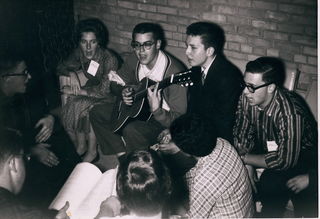Jealousy
The Lesson I Learned Teaching Bob Dylan Folk Singing
Give the "green face syndrome" the red light!
Posted April 3, 2020 Reviewed by Kaja Perina
It was 1959-1960, a pivotal moment in America, a time of transition from the innocence of the '50s to the disillusionment of the '60s. I was in my first two years of undergraduate study at the University of Minnesota and an avid folk-guitarist, dividing my time between my academic assignments and my passion for folk singing. As part of my musical contribution, I gave free folk singing and guitar lessons to students at the Hillel Foundation, a religious organization on campus. Anyone could attend the sessions, which included both group and individual instruction.
One particular session stands out in my mind. I was in the room reserved for my group lessons, strumming a song on my guitar, when a young man appeared in the open doorway. I had never seen him before. I nodded "hello" and invited him in.
"I heard the guitar," he said, walking in and stopping a few feet from where I sat with a group of my students. "I play, too. Would you like to see?"
"Sure," I said, and handed him my guitar. He fingered a few basic chords and sang part of a "top 40" song. I could tell he didn't know much about the guitar or singing, but he did seem interested in what he was doing. For an instructor, interest is what makes teaching worthwhile.
The young man handed me back my guitar. "What kind of music was that you were playing?" he asked.
"Folk guitar," I answered. "If you're interested, I give lessons for free."
"Really?" That seemed to catch my visitor's full attention. "When?"
"Every Wednesday at 2 p.m. Stop by if you'd like."
"OK—I think I'll do that."
"Fine." I wondered silently whether he would actually return. "By the way my name's Marv," I said, extending my hand.
"I'm Bob," he replied, and we shook hands.
As it happened, Bob did return. He became one of my "regulars."

I always looked forward to the guitar lessons because they allowed me to do the two things I loved best: teaching and folk singing. And that's exactly what made things so difficult when, trying to balance my school obligations with my folk singing interests, I realized I couldn't pursue both activities and do justice to either. I reluctantly came to the conclusion that I would have to choose between a career in folk singing and one in academics. I choose academics.
A few days after I announced the end of the folk singing lessons, I was approached by Bob. He wanted to know where he could continue to develop his folk singing skills now that I was no longer available as a teacher.
I thought about his request. In the short time he had been my student it had become obvious to me that Bob didn't have a gifted voice or a great command of the guitar; yet if he was motivated enough to want to pursue folk guitar, who was I to object? "Try the 10 o'clock Scholar," I suggested. "It's a coffee house a few blocks from the campus, and there are always a few folk singers hanging out there."
He thanked me for the suggestion and went on his way. It was the last time I ever saw Bob in person. It wasn't the last time I would cross paths with him, however, although I didn't know it then.
Four years passed. It was the fall of 1963 and I was in my first year of graduate school at Princeton University, trying my best to learn French and German so I could pass the two foreign language reading exams required of all Ph.D. candidates. German was particularly difficult ... I never could understand why they put all their verbs at the end of their sentences.
After a particularly difficult study session, it happened. I had decided to take a walk through the town of Princeton to unwind and get a breath of fresh autumn air. Princeton is a university town with many wealthy homes and (at that time) one major performing arts center called the McCarter Theater. As I strolled past the building, I noted the lighted marquee out front announcing the major coming attraction for the weekend. The illuminated letters spelling out the performer's name were large enough to read from across the street.
I knew who the performer was—although he had changed his surname since he had first asked me to teach him folk guitar back at the University of Minnesota. In those days, his name was Bob Zimmerman. But now the sign read BOB DYLAN.
Seeing Dylan's name in lights at that particular moment was one of the worst experiences of my life. Here I was, a struggling student, spending an entire month trying to pass some language exams just so I could get through my first year of graduate school, and what do I see but one of my students who didn't sing or play guitar any better than I did, already achieving star billing.
Of course, the fact that "my" student Bob had writing talents I never even dreamed of did not cross my mind at that moment!
Instead, I was totally immersed in a full-blown case of The Green Face Syndrome, my name for jealousy. "Why am I here and why is he there?" I mumbled, and railed against the unfairness of an unjust world!
It would be two decades before I could actually listen to a Bob Dylan song without going into a spasm of self-pity or jealousy. And I don't even want to think of how much time I wasted lamenting my misfortune in comparison to his good fortune.
Yet, in the end, Bob Dylan was a blessing of sorts for me. And he will be for you, too, if you learn in a few moments what it took me more than 20 years to discover:
Jealousy—the Green Face Syndrome—is one of the most destructive forces in human existence. Jealousy makes life miserable, elevates pettiness, reduces quality time and self-worth, reduces joyful living, and leaves one angry and bitter. It is like a cancer spreading through your mind, crippling your psychological nervous system.
It's bad news!
My advice? Give the Green Face Syndrome the Red Light!
When I finally came to terms with my own jealousy and realized that my anger at Bob Dylan's success was both foolish and petty; when I could accept his fame without rancor and self-pity; when I stopped comparing his success with mine—I was able to free up the energy I had wasted focusing on his success and use it to enhance my own.
Why I Tell the Bob Dylan Story
It took my encounter with Bob Dylan to make me realize the destructive power of the "Green Face Syndrome." You simply cannot live joyfully when your time is consumed with jealousy!
The reason I tell the story is because of the widespread incidence of jealousy in our contemporary society. The Green Face Syndrome is a big problem, and I hope that when you read about the problems it caused me it will help you steer clear of it in your own life.
This Green Face Syndrome is most pronounced when: people we perceive to be no better than ourselves enjoy more success that we do; we must confront these individuals directly or indirectly in our everyday life, and/or these individuals tend to flaunt what they have, thus making it harder for us to ignore their achievements.
Of course, there is also the more common "garden variety" of this syndrome: it occurs whenever we begin to think in terms of "The grass is greener on the other side of the fence." It seems that in our competitive, keep-up-with-neighbors society, very few, if any of us, can avoid being jealous at some point in our lives. My only hope in bringing my own problem to your attention is to enlighten each of you to the dangers of this affliction and encourage you to reduce its prevalence in your behavior.
What about you?
Be honest with yourself. Do you harbor jealousy toward others? Do you have the Green Face Syndrome toward your sibling(s)? Your spouse? Your friends? Your parents? Your associates at work? A neighbor who has more than you do? Some person you read about in the newspaper or saw on TV? If you do, don't feel alone. Envy, jealousy, the Green Face Syndrome by any name is a common human failing.
But that's exactly what it is: a failing.
If we learn to save our energy for becoming all we are capable of becoming rather than squander it in anger or frustration over what someone else has become--we shall have the greatest chance to maximize joyfulness in our own lives. Don't waste your energy in jealous thoughts and actions. Put your energy where it can pay dividends: achieving your own goals and objectives. Don't worry about how others are doing; focus on how you are doing. What you succeed in doing for yourself and your loved ones will be the factor of enduring importance when you look back on your life.




